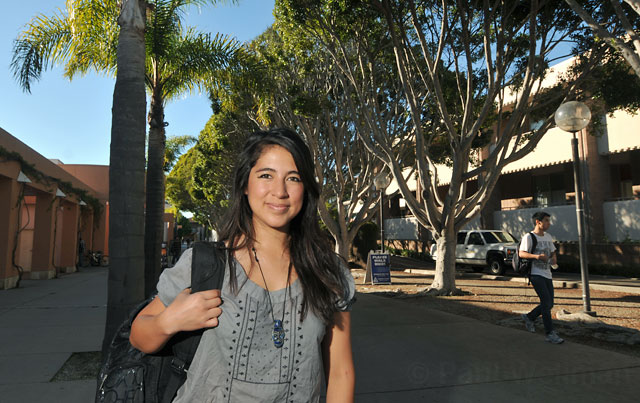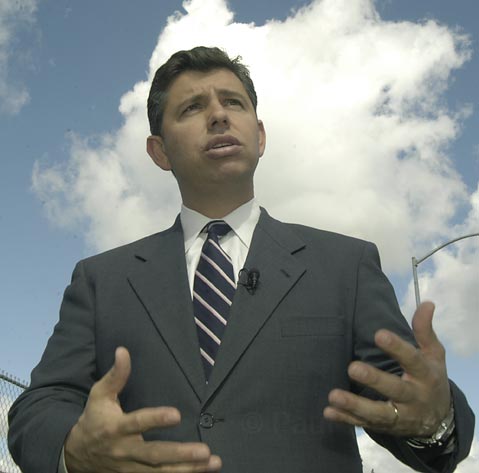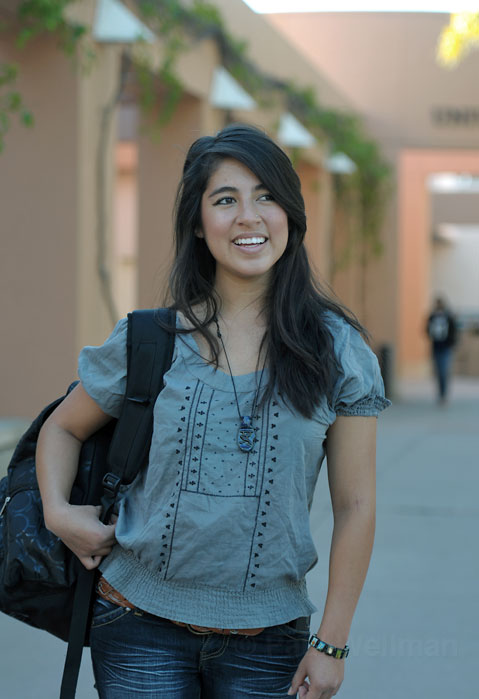Undocumented but Undaunted
Court Rules Illegal Immigrants Can Qualify for Tuition Exemption; DREAM Act Vote on Horizon

Still basking in the California Supreme Court’s recent decision to uphold AB 540 — a law allowing certain undocumented students to pay in-state tuition — young immigrants like UCSB student Neyra Pacheco are nevertheless waiting with bated breath to see if the House of Representatives will vote in favor of the DREAM Act this week.
If enacted, the DREAM (Development, Relief and Education for Alien Minors) Act would allow illegal immigrants who entered the United States before they were 16 years old to earn an opportunity for citizenship if they graduate from high school, go to college or enroll in the military, and avoid getting into trouble.
“I’m thankful and excited not only for myself, but also for the many people who are affected,” said Pacheco in the wake of the unanimous AB 540 ruling handed down on November 15. “But we still have a lot of work to do,” she continued, explaining that the DREAM Act’s fate still hangs in the balance as Democratic lawmakers make a final push for passage before Congress becomes more conservatively minded in a few short weeks.
The challenge to AB 540 — the state’s nonresident tuition exemption approved in 2001 that allows public colleges to offer in-state tuition to students who have attended California high schools for at least three years — was filed by a group of out-of-state students and their families in 2005. They argued undocumented residents shouldn’t be able to qualify for the exemption when they, lawful citizens, were left paying full out-of-state prices.
The group also said AB 540 doesn’t align with federal law which states “an alien who is not lawfully present in the United States shall not be eligible [for college benefits] on the basis of residence within a State.”
In his written ruling, however, Justice Ming W. Chin said AB 540 really doesn’t have anything to do with legal residency, concluding that those who are given exceptions may not all necessarily be California residents. In other words, Chin interpreted, a student who attended high school in California for three years but then moved to a different state would still qualify for in-state tuition. Similarly, a student who attended boarding school in California but lived permanently elsewhere would be eligible.
“If Congress had intended to prohibit states entirely from making unlawful aliens eligible for in-state tuition, it could easily have done so,” wrote Chin, considered one of the more conservative justices. “It could simply have provided, for example, that ‘an alien who is not lawfully present in the United States shall not be eligible’ for a postsecondary education benefit. But it did not do so.”
“Every nonresident who meets [the law’s] requirements — whether a United States citizen, a lawful alien or an unlawful alien — is entitled to the nonresident tuition exemption,” he summed up. “It cannot be the case that states may never give a benefit to unlawful aliens without giving the same benefit to all American citizens.” At the moment, 10 other states in the country have laws similar to AB 540.
Lieutenant Governor Abel Maldonado — who coauthored AB 540 more than a decade ago — spoke to The Independent immediately following the ruling and said the decision validated his motivation for writing the law in the first place: Many undocumented students came to this country with their families when they were very young, he explained. Their illegal status is no fault of their own and they shouldn’t be priced out of a higher education because of it.

Maldonado said he’s spoken with many high schoolers over the years who graduated at the top of their classes but realized, when they started applying to colleges, that they’d be forced to pay more expensive out-of-state costs. (The difference between in-state and out-of-state tuition at a University of California school is around $23,000 per year.) This would oftentimes force them to give up on dreams of continuing on. “California taxpayers are invested in these children,” said Maldonado, “and these are the kids who are going to be holding top jobs in future. For us to spend then throw away 14 years’ worth of taxpayers’ money doesn’t make any sense,” he said.
UC President Mark Yudof echoed a similar sentiment in a prepared statement: “Through their hard work and perseverance, these students have earned the opportunity to attend UC. Their accomplishments should not be disregarded or their futures jeopardized.”
Neyra Pacheco is one such student, able to attend UCSB only because of her AB 540 qualifications. But the environmental studies and history of public policy double major said, even with the exemption, paying for a spot in the university is still a challenge. She started working as a junior in high school, and all the money she earned from then until graduation went toward her first year at college. During summers she’s held down as many as three jobs in order to keep paying her fees, and has been forced at times to take time off while she earns more tuition-bound cash. Plus, she noted, undocumented students still are not eligible for federal, state, or institutional financial aid, meaning they pay everything out of pocket.

Pacheco, born in Oaxaca, Mexico, came to the United States when she was six years old, she said. He mother died when she was two, and she lived with her grandmother while her father worked in the U.S. “Times were tough,” she said. She eventually joined her father, enrolling in kindergarten without knowing a word of English.
But she learned fast, she explained, eventually attending La Cumbre Junior High School and San Marcos High School here in Santa Barbara, excelling in her gifted and advanced-placement courses. Pacheco always knew she was an undocumented resident, she said, but the reality of that fact didn’t weigh on her mind until high school. It was then she began to worry about how she’d be able to eventually drive, vote, and attend college.
Now in her third year at UCSB, Pacheco is a member of a campus group called IDEAS (Improving Dreams Equality Access and Success) that advocates on behalf of immigrant students — many of whom, she said, live in a state of confusion and fear because of their status — connecting them with financial and academic resources. The 50-person organization also educates its peers of their rights and options, explained Pacheco. She estimates that there are currently around 250 undocumented students at UCSB. The number at SBCC is much larger, she predicts, with as many as 2,000 students enrolled right now.
According to admissions officers at UCSB and SBCC, there are 135 and 321 students, respectively, who qualified and are taking advantage of AB 540’s allowances. In the UC system overall, officials said, about 2,000 students paid in-state tuition as provided by the law for the 2008-09 school year. Nearly 80 percent of those students were U.S. citizens or legal residents. Documented students have reportedly accounted for more than two-thirds of those who qualify each year.
Not everyone, though, is happy about AB 540’s survival. Marilyn DeYoung, board chair for the Santa Barbara-based Californians for Population Stabilization (CAPS) said immediately following the ruling, “This was wrong on so many counts. We are optimistic that the U.S. Supreme Court will overturn this, but we really must focus our anger at the California Legislature, which cannot balance a budget, but spends millions of dollars on subsidies to those whose very presence in this country is illegal.”
She claimed “tuition discounts” cost state taxpayers more than $200 million every year. “This is quite outrageous. Our infrastructure is crumbling in an overpopulated, financially strapped California, and the Legislature provides an additional $23,000 per year to each illegal, foreign student — a gift that is not available to U. S. citizens in other states,” she said.
While many expect the state court’s decision to be appealed to the U.S. Supreme Court, the DREAM Act vote’s outcome remains uncertain. But Pacheco and members of IDEAS are hopeful that the law will get pushed through and provide their path to citizenship. “It will benefit students who have been here most of their lives and want to be productive and live their dreams,” Pacheco said. “We want to be able to use our degrees.”



